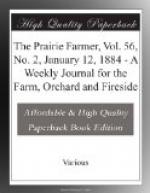FARM NAMES.
Since the call of the prairie farmer for “something new” I have been afraid to follow any of the old beaten paths so long traveled by agricultural writers; and have been on the lookout for the “something new.” Something that does not appear in our agricultural papers, yet of interest to the fraternity. It matters little how trifling the subject may be, if it begets an interest in farm or country life; anything that will make our homes more attractive, more beautiful, and leave a lasting impression on the minds of the boys and girls that now cluster around the farmers’ hearths throughout this vast country of ours.
There is a beautiful little song entitled, “What is Home Without a Mother?” which could be supplemented with another of equal interest, to wit: “What is Home Without a Name?” I answer, a dreary waste of field and fence, there being nothing in the mind of the absent one to remind him of his distant home but a lone farm-house, a barn, long lines of fences, and perhaps a few stunted apple trees; and when he thinks of it, his whole mind reverts to the hot harvest field, the sweat, the toil, and the tiresomeness of working those big fields! Nothing attractive, no pleasant memory. Nothing to draw the mind of the youth to the roof that sheltered his childhood. No wonder boys and girls yearn for a change.
Then what are we to do to change this for the better. I say give your country homes a name, no matter how homely or isolated that home may be. Give each one a name, and let those names be appropriate and musical, short, sweet, and easily remembered and pronounced, and then, when you go to visit a neighbor, either on business or pleasure, instead of saying, I am going to Jones’, or to Brown’s, or Smith’s, let it be, I am going over to “The Cedars,” or, to “Hickory Grove,” or, to “Holly Hill.” How much pleasanter it would sound. There would be no mistake about your destination, there being perhaps half a dozen Jones, Browns, or Smiths within five miles of your home, but only one “Hickory Hill.” Then, when young folks make up their surprise parties during the long, cold, winter evenings, in place of notifying each other that they are going to surprise the James’, the Jones’, or the Jackson’s, it would be, we are going to surprise “Pleasant Valley” “Viewfield” or “Walnut Hill.” Every member of the surprise party would know the place intended, and the squads and companies of sleighs with their closely packed loads of laughing girls, and well filled baskets of good things would begin to marshal on the several roads that lead towards the trysting place; and when the merry-makers reach the well trimmed walnut grove from which the farm takes its name, and march up to the dwelling, instead of shouting: Mrs. Brown, we greet you, or Uncle Brown, etc., it would be: “Walnut Hill” we greet you, which would include all the Browns, old and young.




